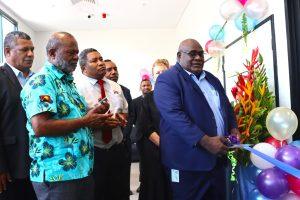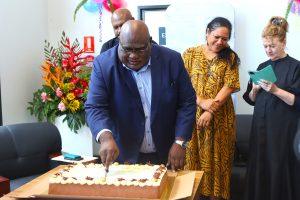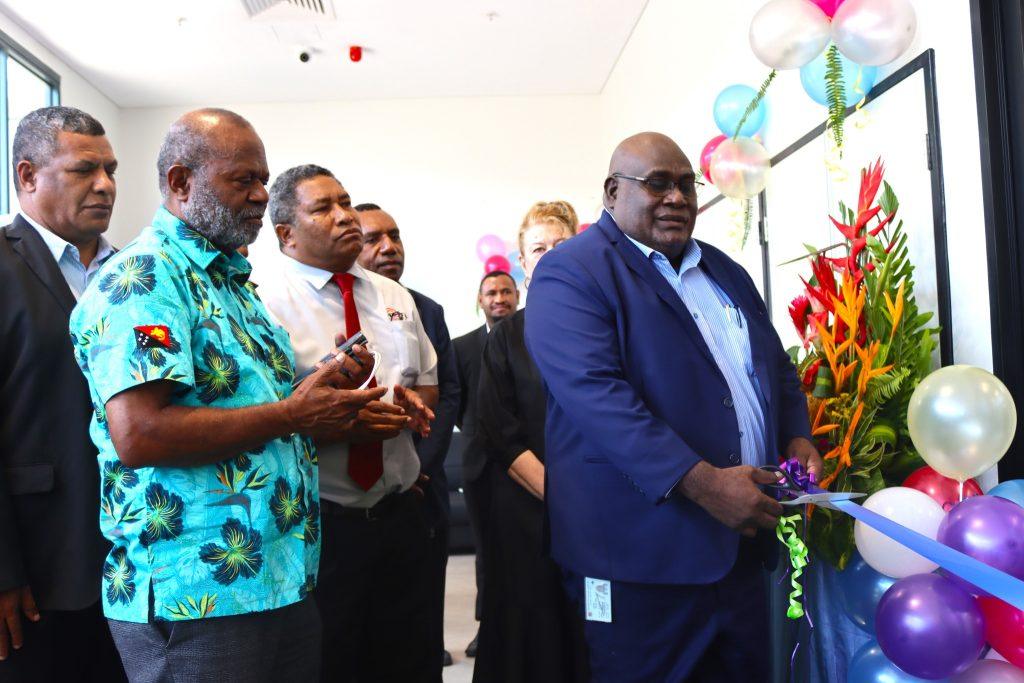Opening Statement by Minister for Information and Communication Technology, Hon.Timothy Masiu, MP – on the occasion of Universal Access Scheme (UAS) Office Opening
Friday, 01 March, 2024, Port Moresby. I am indeed pleased to officiate the opening of the Office of the Universal Access Scheme or UAS secretariat.
It is an important occasion, signifying the Marape-Rosso Government’s commitment to connect all Papua New Guineans. The UAS Secretariat was established to coordinate the implementation of the Government’s policy on Universal Access Scheme.
The key objective of the UAS policy is embedded in the National ICT Act, and its core function is clearly defined. This function is to facilitate the provision of ICT services to the underserved or unserved areas of PNG, particularly the rural and remote parts of PNG, by funding relevant ICT projects. ICT providers in PNG, like others in other developing nations, target the urban areas when providing coverage of ICT services for economic reasons. The rural and remote areas are not generally covered.
It is in this setting that the UAS Secretariat endeavors to facilitate expansion of ICT network coverage into areas that would otherwise be unviable or uneconomical for the service providers.
At this juncture, I wish to thank the three mobile operators, Digicel PNG limited, Telikom Limited and Vodafone for their mobile network coverage throughout PNG.
This is despite the many challenges that are faced by the operators in the provision of their services. The UAS team, currently has 8 members in the team. This number will increase by the end of this year by about 50 percent as the Secretariat looks to build its capacity to deliver on its mandate.
This growth in staff numbers has bought about the need for additional office space which is why this new office space is being opened. This team build-up is required to deliver on the approved UAS Projects that are tendered out annually. These projects are approved by the ICT Minister before being advertised for ICT operators to bid. As an example, the total value of approved projects for 2024 is K32.294M.
The procurement process has now commenced with awards expected during the year for implementation, some of these projects will rollover to next year.
Some of the Projects for this year includes new mobile towers to extend mobile internet to unserved and unserved areas mainly in rural PNG and will bring connectivity to about another 145,000 people.
Another project approved is the International Mobile Equipment Identity Register to track and find out where a mobile devise is currently located and to block the connecting to the networks and basically disabling the phone. Other projects include broadband connectivity to extend key government through digital connectivity, emergency communications and capacity building. It is equally important that the function of NICTA must be clearly distinguished from the function of UAS secretariat. NICTA regulates the ICT industry through the issuance of licenses and resources such as numbering and spectrum.
UAS secretariat must focus on identifying unserved and underserved areas in the country, mobilize funding and coordinate the implementation of UAS with all ICT operators to ensure connectivity reaches all parts of PNG. That is why it is important that UAS secretariat must have its own office and undertake its duties independently of the regulatory functions performed by NICTA.
In this regard, I will propose that UAS secretariat must have its own Corporate Plan to deliver on Government’s policy objectives on UAS.
This will compliment your new office to provide a conducive environment for UAS Board, Secretariat and staff to engage internally and externally to deliver on its core mandate of bringing connectivity to our citizens wherever they are.
On this note, I challenge UAS Secretariat Staff to make the best use of this facilities to progress your statutory responsibilities. There has to be accountability and transparency in what you are doing, and most important, we need to see the progressive reports on impacts of UAS program such as the unserved and underserved communities that are connected and benefiting.These reports must be widely published.
There are parts of the country that still needs connectivity, and by connectivity I am referring to 4G coverage where our people will have access to internet on their smart phones that will enable them to engage in e-commence, e-learning and range of other e-services that the Department of ICT is now spearheading.
We need a Master Plan that maps out the unconnected parts of PNG, the number of people in those areas that are unconnected and let us develop a short to medium- and long-term plan to bring connectivity to these areas. By 2027, all parts of the country where there are people living, should have connectivity.
With that, ladies and gentlemen, I want to congratulate NICTA CEO and your staff for the hard work in setting up the Office.
I also want to thank the UAS Board for your guidance towards making sure UAS secretariat have an Office of its own and the UAS secretariat for this milestone achievement.
Thank you and God Bless PNG.



